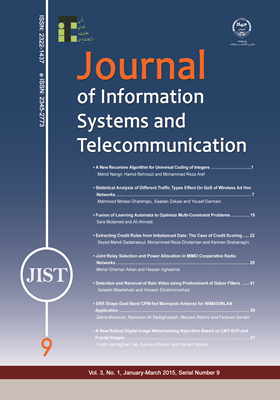Detection and Removal of Rain from Video Using Predominant Direction of Gabor Filters
محورهای موضوعی : Image ProcessingGelareh Malekshahi 1 , Hossein Ebrahimnezhad 2
1 - Sahand University of Technology
2 - Sahand University of Technology
کلید واژه: Inpainting, Background Subtraction, Removal of Rain, Gabor Filters, Rain Detection,
چکیده مقاله :
In this paper, we examine the visual effects of rain on the imaging system and present a new method for detection and removal of rain in a video sequences. In the proposed algorithm, to separate the moving foreground from the background in image sequences that are the frames of video with scenes recorded from the raindrops moving, a background subtraction technique is used. Then, rain streaks are detected using predominant direction of Gabor filters which contains maximum energy. To achieve this goal, the rainy image is partitioned to multiple sub images. Then, all directions of Gabor filter banks are applied to each sub image and the direction which maximizes the energy of the filtered sub image is selected as the predominant direction of that region. At the end, the rainy pixels diagnosed in per frame are replaced with non-rainy pixels background of other frames. As a result, we reconstruct a new video in which the rain streaks have been removed. According to the certain limitations and existence of textures variation during time, the proposed method is not sensitive to these changes and operates properly. Simulation results show that the proposed method can detect and locate the rain place as well.
In this paper, we examine the visual effects of rain on the imaging system and present a new method for detection and removal of rain in a video sequences. In the proposed algorithm, to separate the moving foreground from the background in image sequences that are the frames of video with scenes recorded from the raindrops moving, a background subtraction technique is used. Then, rain streaks are detected using predominant direction of Gabor filters which contains maximum energy. To achieve this goal, the rainy image is partitioned to multiple sub images. Then, all directions of Gabor filter banks are applied to each sub image and the direction which maximizes the energy of the filtered sub image is selected as the predominant direction of that region. At the end, the rainy pixels diagnosed in per frame are replaced with non-rainy pixels background of other frames. As a result, we reconstruct a new video in which the rain streaks have been removed. According to the certain limitations and existence of textures variation during time, the proposed method is not sensitive to these changes and operates properly. Simulation results show that the proposed method can detect and locate the rain place as well.


